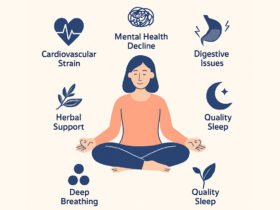In today’s fast-paced world, where stress and unhealthy lifestyle choices are rampant, it is essential to shed light on a prevalent health concern that affects millions of people worldwide: hypertension. Also known as high blood pressure, hypertension can have serious consequences if left unaddressed. In this blog, we will delve into the causes, symptoms, and effective management strategies for hypertension, empowering you with knowledge to take control of your health.
What is Hypertension?
Hypertension refers to a medical condition characterized by persistently elevated blood pressure levels. It occurs when the force of blood against the walls of the arteries is consistently too high. Blood pressure is measured using two values: systolic pressure (the top number) and diastolic pressure (the bottom number). The normal blood pressure reading is typically around 120/80 mmHg. However, readings consistently above 130/80 mmHg are indicative of hypertension.
Causes of Hypertension
1. Unhealthy Lifestyle Habits: Poor dietary choices, lack of physical activity, excessive salt intake, smoking, and excessive alcohol consumption can contribute to the development of hypertension.
2. Genetics and Family History: Hypertension can also have a genetic component, making individuals with a family history of high blood pressure more susceptible.
3. Age and Gender: As we age, the risk of developing hypertension increases. Men are more likely to develop hypertension before the age of 55, while women are at higher risk after menopause.
4. Underlying Medical Conditions: Certain medical conditions like kidney disease, hormonal disorders (e.g., thyroid problems), and sleep apnea can contribute to hypertension.
Symptoms of Hypertension
Hypertension is often referred to as a silent killer because it typically does not cause noticeable symptoms in the early stages. However, as the condition progresses, some common symptoms may manifest, including:
1. Headaches: Persistent headaches, especially at the back of the head and in the morning, can be a sign of hypertension.
2. Shortness of Breath: Difficulty breathing or shortness of breath, even during routine activities, may indicate high blood pressure.
3. Chest Pain: Chest pain or discomfort can be a symptom of hypertension-related heart problems.
4. Fatigue and Dizziness: Feeling constantly tired, exhausted, or experiencing dizziness could be indicative of high blood pressure.
Effective Management Strategies
- Adopt a Healthy Lifestyle: Start by incorporating a balanced diet rich in fruits, vegetables, whole grains, lean proteins, and low-fat dairy products. Reduce sodium intake, limit alcohol consumption, quit smoking, and engage in regular physical activity.
- Maintain a Healthy Weight: Losing excess weight and maintaining a healthy BMI (body mass index) can significantly lower blood pressure.
- Reduce Stress: Practice stress management techniques such as meditation, deep breathing exercises, yoga, or engaging in hobbies to reduce stress levels.
- Medication and Regular Check-ups: In some cases, medication may be necessary to manage hypertension effectively. Consult with a healthcare professional to determine the appropriate medication and dosage. Additionally, regular check-ups and monitoring of blood pressure are essential for long-term management.
Conclusion
Hypertension is a serious health condition that requires attention and proactive management. By understanding the causes, recognizing the symptoms, and implementing effective lifestyle changes, individuals can take control of their blood pressure levels and reduce the risk of associated complications. Remember, prevention and early intervention are key to maintaining a healthy cardiovascular system. Prioritize your well-being, and consult with healthcare professionals for personalized advice and guidance on managing hypertension effectively.











Leave a Reply